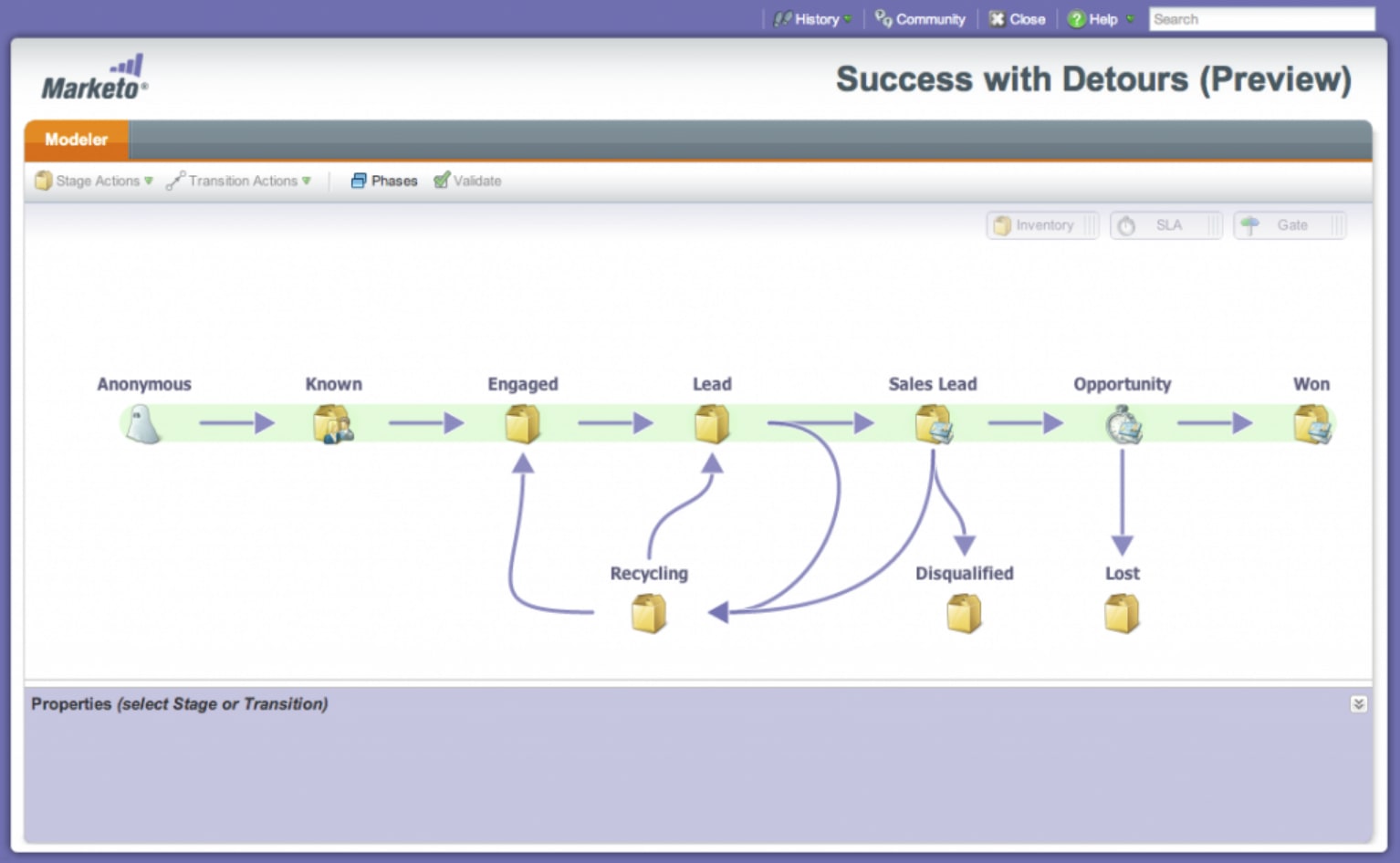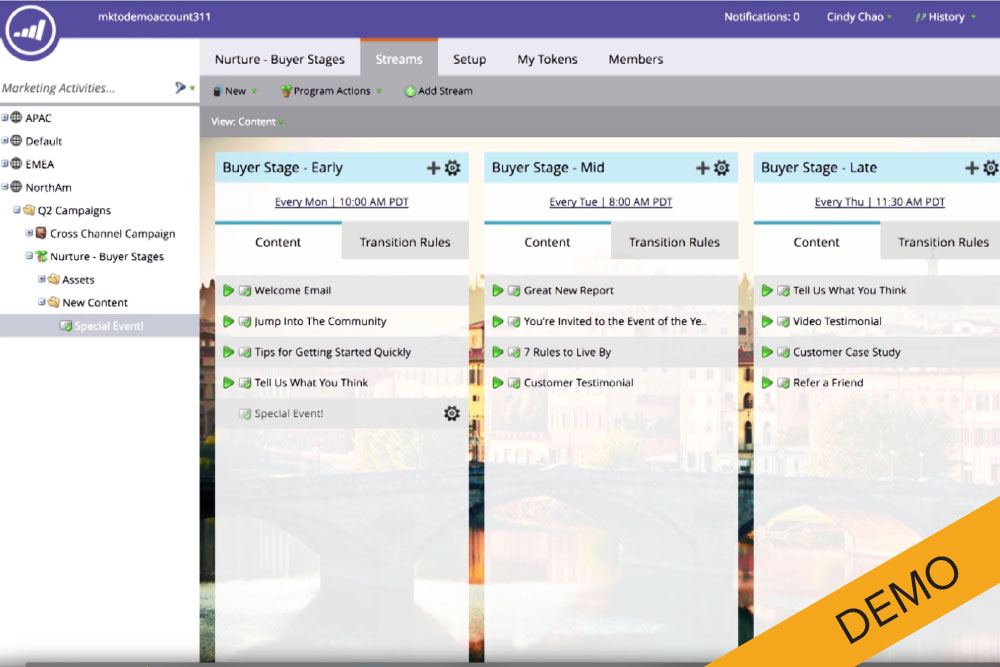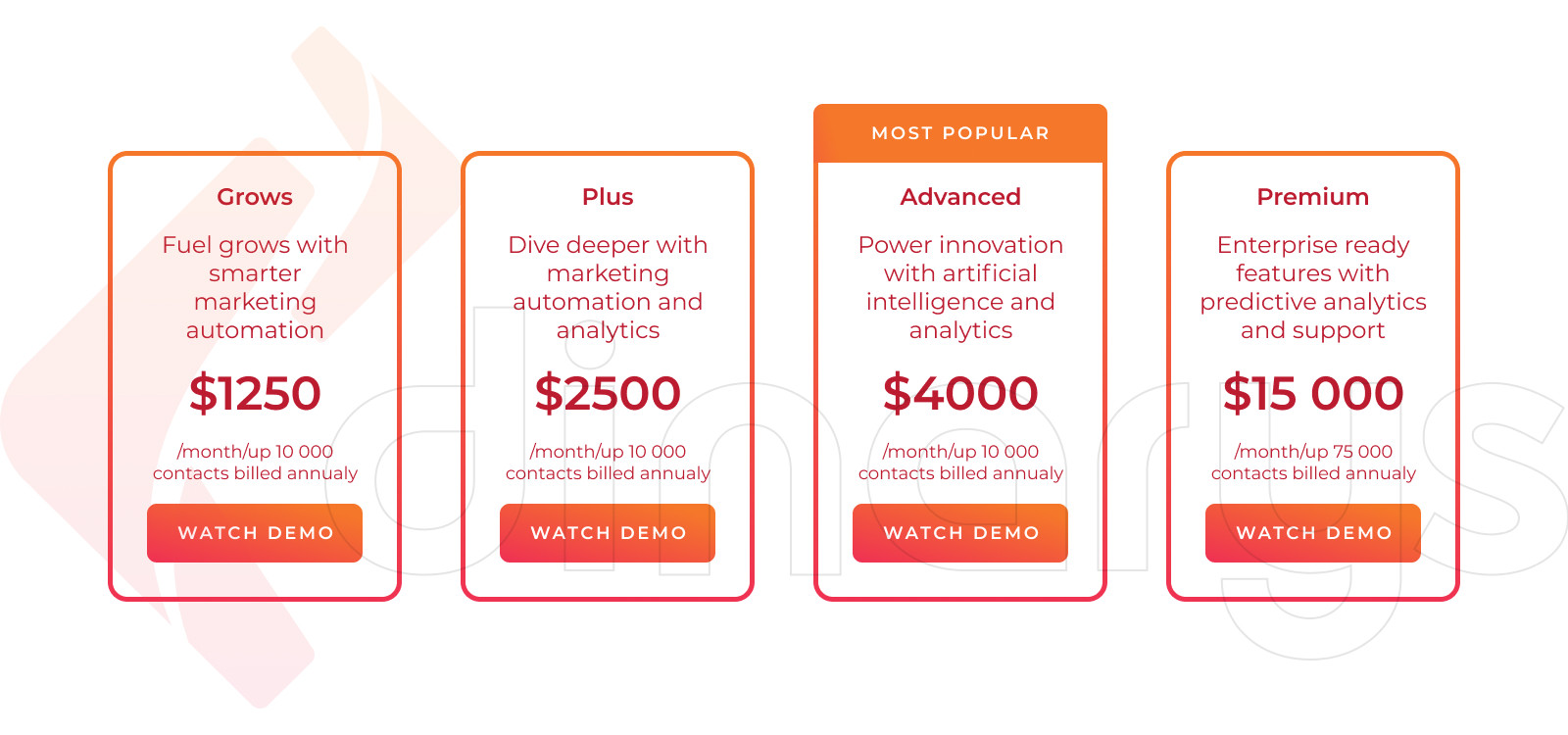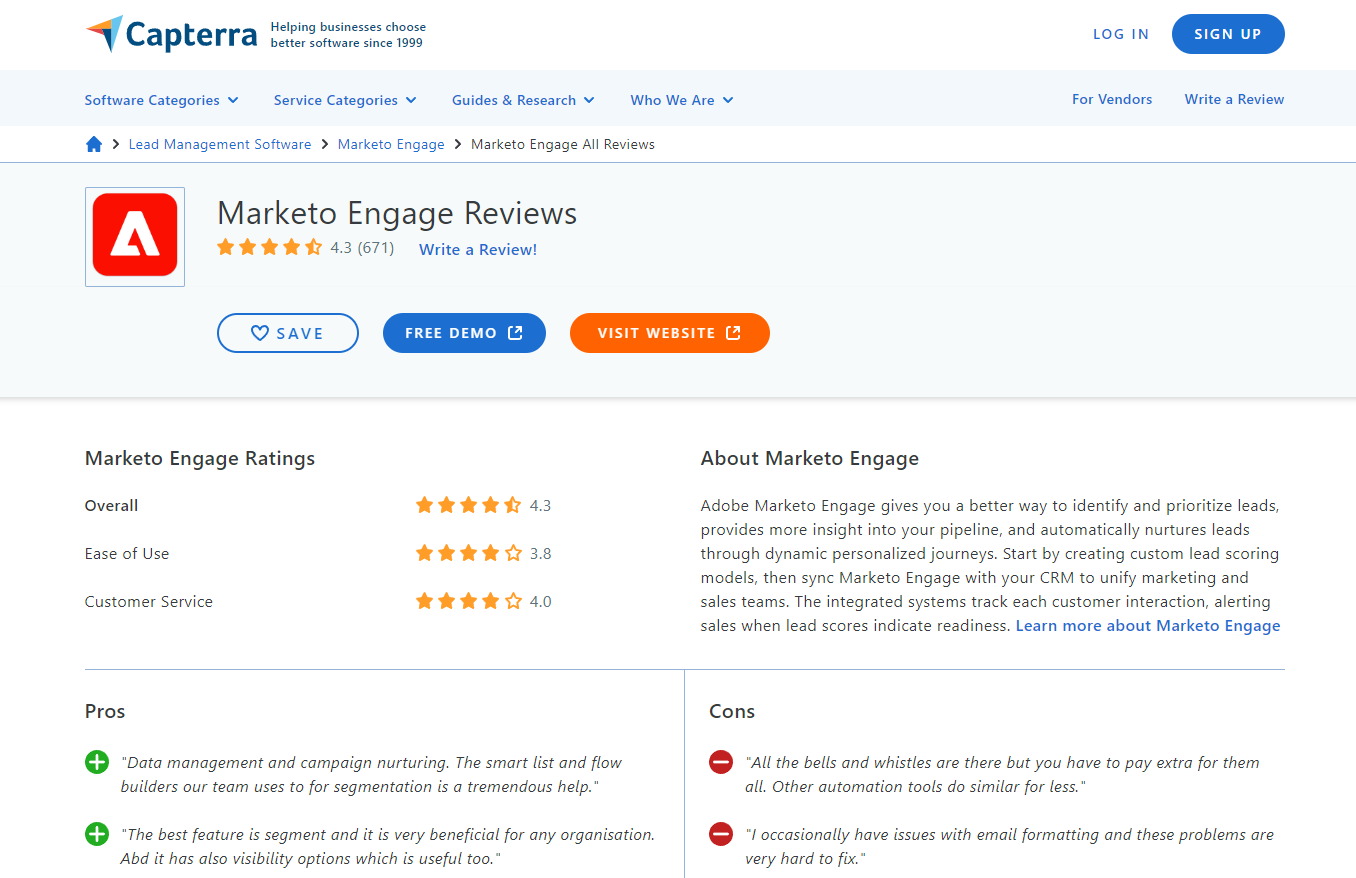With the rise of digital marketing, choosing the right marketing platform has become crucial for business success. Marketo and Constant Contact are two popular options but have key differences entrepreneurs should understand before deciding which solution best fits their needs.
In this in-depth Marketo vs Constant Contact comparison guide, we evaluate the two email marketing platforms across various categories including market position, ease of use, customization options, functionality, performance, support, pricing, and reviews.
Our goal is to provide unbiased insights into the strengths and weaknesses of each platform to help you determine which solution is the best investment for supporting your digital marketing efforts.
1. Understanding the Basics
Marketo was founded in 2006 by Phil Fernandez, Jon Miller, and David Morandi. The software quickly became popular for its innovative marketing automation features aimed at B2B companies. Today, Marketo has over 5,000 customers and is owned by Adobe, solidifying its position as an industry leader. Check out the Marketo Facebook Page with over 174K followers.
Constant Contact launched in 1998, was founded by Randy Parker and Richard Yaeger. While initially focused on small business email marketing, Constant Contact now provides a wider suite of digital marketing tools for both B2B and B2C companies. They have over 600,000 customers, making them a major player. You can connect with other users in the Constant Contact Facebook group.
2. Features and Functionality
Automation
Marketo

Marketo makes it easy to create automated campaigns with its drag-and-drop Campaign Builder. You can trigger emails based on consumer actions and schedule a series of follow-up messages automatically. Marketo also allows you to set up multi-channel nurture campaigns across email, mobile, social, and more.
Key features of this marketing automation software include tools like Smart Lists and Sales Insight that allow you to automatically group contacts and trigger actions when they hit key thresholds. Marketo’s library of over 300 marketing templates and playbooks also simplifies automation.
Constant Contact
Constant Contact provides an intuitive automation builder to set up “If This Then That” (IFTTT) workflows between connected tools. For example, you can automatically add Gmail contacts to an email campaign or post published blog content to social media.
While the interface is easy to navigate, Constant Contact has fewer native marketing automation capabilities compared to Marketo and is better supplemented with connections to other apps. They do not offer the depth of multi-touch attribution and predictive lead scoring features.
Winner: Marketo
With its robust selection of automation tools and simplified campaign builder, Marketo comes out ahead for its flexible options that require less manual work to execute sophisticated marketing workflows. The breadth of triggers, filters, and actions within Marketo enables more customization for complex automation tasks.
Email Templates
Marketo
Marketo provides hundreds of professionally designed email templates covering common email marketing campaigns and automation. Templates are organized by category, making it easy to find ones for promos, announcements, newsletters, and more. You can fully customize colors, fonts, content blocks, and images directly in the drag-and-drop editor.
Dynamic content can be added to pull in real-time personalized data. Templates are also mobile responsive out of the box. While Marketo’s template library is robust, the editor could feel overwhelming if you want simpler control.
Constant Contact
Constant Contact offers neatly organized email templates designed for small businesses. Although their selection doesn’t run as deep as Marketo, they provide enough variety for essential marketing needs. Customizing templates is user-friendly with options to switch background colors and images, adjust font sizing/styling, and drag-drop-in new blocks fast.
While editing functionality works fine for basic changes, those wanting more advanced design control may find it limiting. But if you’re looking for access to quality templates that don’t require in-depth editing skills, Constant Contact is the easier pick.
Winner: Tie
With Marketo offering more template variety for B2B marketing and Constant Contact making it simpler for novices to customize designs, both platforms cater well to their target users. For those wanting deeper design control, Marketo would be the winner – but Constant Contact better equip beginners with quality templates that don’t need extensive editing changes out the gate.
Segmentation
Marketo
Marketo enables in-depth audience segmentation with tools to create both static and dynamic smart lists based on multiple criteria like demographics, behavior, preferences, and engagement. You can get very granular, segmenting down to custom fields.
Segmentation settings also allow you to define minimum and maximum thresholds so contacts get added or removed automatically. This allows you to personalize messaging to focus on where each audience is in the buyer’s journey.
Constant Contact
While Constant Contact has basic segmentation features to group contacts by location, purchase history, and a few other defaults, it lacks the robust customizable options seen in Marketo. You cannot create segments based on multiple complex parameters.
Constant Contact’s simpler segmentation works well for very small businesses but becomes limiting if you want to finely tune groups with custom filters and advanced rules. The lack of dynamic lists also requires manual updating.
Winner: Marketo
Marketo is the clear winner, enabling marketers to divide their audiences into highly targeted lists and subsets. Dynamic segmentation equips you to personalize communication with a level of precision unmatched by Constant Contact’s more basic targeting abilities.
Analytics
Marketo
Marketo provides marketers with powerful and interactive analytics across every digital channel to measure the ROI and optimize the performance of campaigns. Beyond core metrics like clicks and opens, Marketo tracks comprehensive attribution touching each individual interaction to see the full impact across every touchpoint in the customer journey.
Robust and customizable dashboards offer an intuitive overview along with the ability to dig deeper into campaign data. Features like predictive lead scoring also leverage AI to provide actionable insights for targeting. For those wanting additional reporting functionality, Marketo integrates with leading BI tools like Tableau and Excel.
Constant Contact
The analytics in Constant Contact focus specifically on email campaign performance without encompassing cross-channel data. Core reports cover essential email metrics – opens, clicks, bounces, forwards, replies, link clicks, and unsubscribes. Data is presented clearly to help understand your audience engagement.
However, those wanting to measure performance beyond email require third-party connections as Constant Contact’s native reporting remains channel limited. There are also minimal predictive modeling capabilities for guidance. The tool caters to small business owners more so than marketers needing to make data-driven strategic decisions across campaigns.
Winner: Marketo
Marketo is better equipped for both strategic and tactical applications of analytics with its robust attribution modeling, customizable dashboards, and predictive reporting – as well as integrations to expand capabilities further. The actionable insights drive better results.
Unique Features
Marketo
One of Marketo’s most unique innovations is its account-based marketing tools. Features like lead management, ABM Analytics provide insights to engage multiple Buying Center stakeholders from target accounts. Marketo also integrates with data providers like ZoomInfo to append firmographic data for better ABM targeting.
Additionally, Marketo offers exclusive access to Accelerator programs that provide qualified users with dedicated strategic consulting, training scholarships, and success resources to maximize their Marketo investment.
Constant Contact
A standout capability offered by Constant Contact is its Website and Logo Maker. These tools provide free simple templates and DIY design functionality for small businesses wanting to establish a basic online presence quickly. This is part of how Constant Contact has become known as one of the best email marketing platforms out there.
While not as technically advanced as Marketo’s offerings, for entry-level users needing basic marketing collateral built in, Constant Contact provides adequate options to create a starter brand image and web presence minus the added costs.
Winner: Marketo
While Constant Contact certainly simplifies basic brand asset creation for new users, Marketo’s account-based marketing capabilities and resource accelerator programs demonstrate greater innovation targeted to established marketers ready to employ more advanced strategies.
3. Ease of Use
Marketo

Marketo provides a modern, intuitive user interface that’s well-organized across three main hubs – Marketing Activities, Analysis, and My Marketo. Dashboards, forms, and campaign creation workflows utilize drag-and-drop functionality for simplicity.
While there may be a steeper learning curve for newer users, Marketo offers a selection of getting-started resources like onboarding checklists, training videos, community forums, and guided product tours to ramp up quickly. The investment in ramp-up pays off with more sophisticated capabilities.
Constant Contact
Constant Contact focuses heavily on ease of use, providing a streamlined interface that keeps key functionality front and center. Minimal design makes navigation cleaner for marketing novices to create campaigns, segment contacts, and access reports without complexity blocking the process.
The tool prioritizes simplifying core features over advanced functionality. But the trade-off means an eventual plateau in capabilities compared to Marketo. Self-serve support resources also seem lighter for those wanting more strategic guidance.
Winner: Tie
Both platforms achieve ease of use but through different approaches – Marketo via coach-guided onboarding into advanced capabilities or Constant Contact through inherent simplicity that needs less ramp-up support. Users wanting simpler self-serve access can turn to Constant Contact quickly while those wanting guidance to unlock fuller strategic functionality may invest more into Marketo’s learning curve.
4. Email Deliverability
Marketo

Marketo provides built-in deliverability tools like IP warming, sender scoring, and reputation monitoring to optimize email delivery rates. The platform makes it easy to authenticate your sending domains via methods like SPF, DKIM, and DMARC.
Granular analytics provide visibility into deferral rates by ISPs to enhance deliverability over time. Users can also leverage an automated email validation service to audit content before sending to maximize inbox placement.
Constant Contact
As an established email marketing platform, Constant Contact excels at deliverability with proactive sender reputation safeguards and ISP relationship building. Features like Smart Send technology optimize open and clickthrough potential based on past performance data.
Emails are also run through an integrated validating service pre-send. For smaller volumes typical of their customer base, deliverability works reliably with strong inbox placement rates. Larger scale users may require more rigorous monitoring capabilities found in Marketo.
Winner: Tie
Both platforms offer strong email deliverability rates out of the box. For smaller businesses on Constant Contact, this works seamlessly without heavy lifting. Larger enterprises may invest more effort into Marketo’s expanded deliverability analytics to customize at higher volumes but achieve excellent delivery outcomes all the same.
5. Customer Support and Community
Marketo

Marketo provides 24/7 customer support via live chat, phone, and email. As an enterprise-level platform, support reps are well-trained on the wide range of Marketo products and features. Whether you work alone or with a marketing team, you’ll get the help you need when you need it. Though direct support requires higher-tiered plans, all users get access to an extensive library of DIY help articles, coaching resources, and tutorials.
Users can also leverage Marketo’s vibrant online community for advice to amplify digital marketing efforts. The Marketo Marketing Nation community hub offers discussion forums while users also connect via the Marketo Users Group on Facebook.
Constant Contact
Constant Contact focuses support on beginner-friendly self-serve resources like knowledge base articles and getting started webinars. Direct email and chat support is available but with a slower response rate than Marketo according to reviews.
In terms of community, the Constant Contact Customer Community Facebook group provides some ability for customers to network but pales in activity compared to Marketo’s bustling hubs filled with active discussions and ideas exchange.
Winner: Marketo
Marketo edges out Constant Contact by providing faster direct support response combined with access to the larger and more vibrant user community enabling collaboration with hundreds of thousands of engaged peers. Resources are more robust.
6. Integrations
Marketo
Adobe Marketo Engage connects with over 150+ marketing, sales, and analytics solutions via APIs and bi-directional syncing. Natively integrated tools include sales automation, Salesforce, Google Analytics, Facebook Ads, LinkedIn Ads, CRM and MAP systems like Dynamics 365, and popular e-commerce platforms such as Shopify, Magento, and WooCommerce.
The LaunchPoint ecosystem also makes it easy to add functionality with third-party apps for webinars, surveys, lead generation, custom modeling, and predictive intelligence tools. Marketo streamlines extend beyond its robust core feature set.
Constant Contact
Constant Contact offers 70+ app integrations focused mainly on syncing contacts/leads data from email and social campaigns into CRMs and other small business tools. Options like Mailchimp, SurveyMonkey, Eventbrite, and basic Shopify connectivity provide supplemental capabilities that enhance core email functions.
But lacking its own performance marketing features, Constant Contact relies heavily on third-party extensions for more advanced needs seen natively in Marketo. Less flexibility means more piecing parts together to mimic expanded capabilities.
Winner: Marketo
The Marketo Constant Contact comparison shows Marketo as the clear winner. The breadth of its tightly integrated ecosystem surpasses Constant Contact’s patchwork model that demands more apps added in to fill gaps. With its wider native feature set and broader two-way app connectivity, Marketo provides better performance straight out of the box.
7. Pricing
Marketo

Marketo pricing is customized quote-based depending on usage needs. Entry-level plans start around $1,250/month for up to 10,000 contacts. Mid-tier pricing ranges ~$2,500+ for expanded email capability, multi-user access, and sales integration features. Enterprise-scale packages are $4,000+/month.
While Marketo carries higher price tags than Constant Contact, the robust functionality, API connections, predictive modeling capabilities, analytics, and premier support provide immense value from the investment for established, high-volume marketing teams.
Constant Contact
Constant Contact’s free trial lets you send to 500 contacts. The Lite email plan is $12/month for up to 500 contacts with additional features like the marketing CRM, event management tools, and social marketing features.
The Standard plan is $35/month and comes with 3 users, pre-built automation, and contact segmentation features.
For $80/month, you get the Premium plan, which includes unlimited users, custom automation, custom segmentations, revenue reporting, and Google Ads Manager.
The affordability can suit beginner email marketers, but those wanting to scale functionality and performance through integrations may find recurring costs adding up beyond the projected budget as their business expands over time.
Winner: Tie
Both platforms provide pricing models aligned with their target customer segments. For small businesses, Constant Contact presents an affordable entry point. High-volume teams get strategic enterprise-grade capabilities from Marketo worth the premium investment.
8. Reviews and Reputation
Marketo

Marketo earns strong reviews from enterprise marketers praising its powerful analytics and attribution modeling capabilities that provide clear ROI reporting to optimize spend. Ease of segmenting contacts and creating customized buyer journeys also receives positive feedback.
Some negatives cite the platform’s complexity being overkill for small teams. Support and high costs associated with advanced features also come under scrutiny from select users, though most agree the value matches the price. See Marketo user reviews on Capterra.
Constant Contact
Constant Contact wins praise from small business owners for simplifying email marketing and providing quality templates that make it easy for novices to create campaigns with minimal effort. Affordable pricing tiers also appeal to frugal startups.
Yet recurring costs can add up once you want to scale beyond basic features. Some reviews also cite issues with contacts syncing properly with integrated CRMs. And lack of more advanced analytics leaves some wanting more. See Constant Contact user reviews on G2.
Winner: Tie
For their respective target users, both platforms maintain strong reputations and reviewer satisfaction. Marketo provides enterprise value while Constant Contact simplifies email marketing for small businesses. Each matches differing needs.
9. FAQ’s
Marketo FAQs
- What kind of training and support does Marketo offer?
Marketo provides live chat support, email/phone assistance, online knowledge base articles, community forums, and guided training resources like onboarding checklists, videos, and quickstart product tours. - Does Marketo integrate with Salesforce?
Yes, Marketo offers deep native integration with Salesforce to sync contact and lead data, track interactions, trigger workflows, and more. - What is Marketo’s pricing model?
Marketo pricing is customized quote-based depending on usage needs, number of contacts, and functionality required. Plans start around $1,000/month for up to 10K contacts. Enterprise options are $5,000+/month.
Constant Contact FAQs
- Does Constant Contact have email templates?
Yes, Constant Contact provides professionally designed email templates across several common marketing categories that users can customize through a simple drag-and-drop editor. - Is Constant Contact GDPR Compliant?
Constant Contact enables users to comply with GDPR regulations around data privacy rules through features managing contact consent preferences and access requests. - What is Constant Contact’s pricing?
Constant Contact has three flat-rate pricing tiers based on number of contacts: $25/month for 500 contacts, $45/month for 2,500 contacts, and $70/month for 5,000 contacts.
Final Thoughts
Choose Marketo if…
Marketo is the best choice for enterprise companies already employing sophisticated digital marketing campaigns across multiple channels. The advanced analytics, predictive modeling, and robust integration ecosystem provide immense strategic value to scale expansion efforts. Teams who will utilize the full suite of Marketo’s capabilities get the most for their investment.
Choose Constant Contact if…
Constant Contact shines best for novice email marketers such as local small business owners needing an affordable way to create basic automations and newsletter campaigns without complex functionality. The simplicity speeds up execution for those focused more on core email tactics rather than advanced cross-channel strategy.
If you aren’t convinced that this email marketing platform is for you, check out my Constant Contact alternatives article to look at other options.
